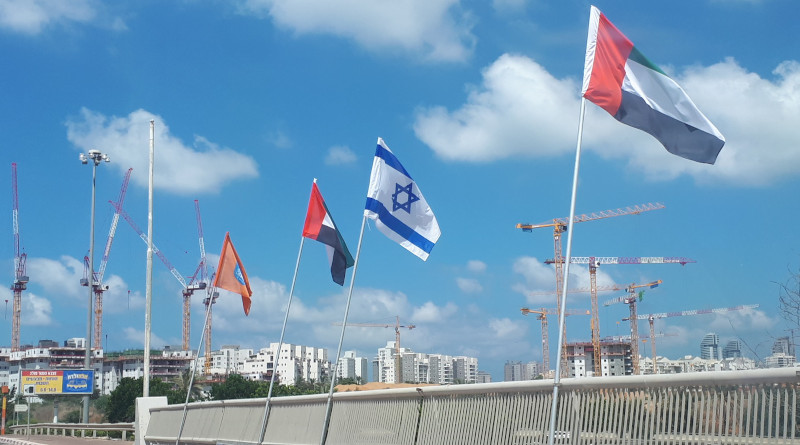UAE Has Skillfully Moved To Check Iranian Aggression – Analysis
By Arab News
By Dr. John C. Hulsman*
The German philosopher Georg Hegel was surely on to something when he wryly noted that “reading the morning newspaper is the realist’s morning prayer.” Realism as a way of thinking is grounded in the actual facts of life as it is lived — the empirical realities of the world that cannot be wished away. It is this aspect of realism, more than anything else, that explains the stunningly successful act of diplomacy — the normalization of relations between the UAE and Israel — concluded last week.
The terms of the deal are simple but of the greatest importance. The UAE agrees to have full normalization of relations with Israel, becoming only the third Arab country to do so, following Egypt and Jordan. In return, the government of Prime Minister Benjamin Netanyahu agrees to suspend its highly controversial plan to annex some 30 percent of the West Bank.
Two key concessions underpin the treaty. Israel’s suspension of the planned West Bank expansion has real political costs for Netanyahu, getting him into hot water with his right-wing Likud party base just as he desperately needs them to fight off the three court cases for corruption he is presently weathering. In return, the UAE recognizes Israel, even as the Palestinian issue remains far from solved. Upon these two bedrock concessions an enduring realignment has begun.
Lurking beneath these significant diplomatic concessions lies realist thinking of the first order on both sides. First, in many ways, the deal — as realists would note happens all the time — is merely the political recognition of what has already been happening in the newspapers (to quote Hegel) for quite a long time. Informal Israeli and UAE security and commercial ties have been growing for almost two decades. In one sense, the treaty merely codifies what has already happened organically.
Second, in realist terms, Netanyahu is merely making a strategic virtue of a domestic necessity. Though the prime minister is without doubt the Harry Houdini of his political generation, surviving endlessly in the shark tank that is Israeli politics, lately his wings have been clipped. According to a July Channel 13 news poll, only 34 percent of respondents approved of Netanyahu’s job performance — a precipitous fall from his 70 percent approval rating in April of this year. Failures over the coronavirus, the corruption trials, and endless political jockeying have all taken their toll.
This domestic political reality explains the prime minister’s initial pivot to his right-wing base to shore up political support in this tsunami of a crisis.
However, here Netanyahu found himself blocked, as both Foreign Minister Gabi Ashkenazi and Defense Minister/Alternate Prime Minister Benny Gantz made it clear they would bring down the government should the partial annexation take place.
Aware of both his plummeting popularity and the Israeli public’s voter fatigue after the endless general elections of the past year, Netanyahu brilliantly made a virtue of necessity, pivoting to the UAE deal. The move shores up his shaky government and has proven immensely popular with the Israeli public. A Channel 12 poll conducted after the deal finds fully 77 percent of respondents in favor, with only 17 percent opposed. In realist terms, Houdini has escaped again.
Third, the UAE has skillfully moved to check Iranian aggression in the Middle East. Again, one needs to look at this with realist eyes. The US, the long-term champion of the anti-Iranian coalition, is doing less and less in the region. As such, shoring up the coalition by including Tehran’s most stalwart enemy, the Netanyahu government, makes eminent strategic sense for the UAE, all the more so as Israel is an undoubted first-class regional military and commercial power.
Just as the US has been doing less, Iranian expansionism has grown. Tehran’s sponsored proxy forces in the Middle East have grown more powerful in Lebanon, Syria, Iraq and Yemen, making it clear that Iran is now the greatest threat to regional stability in the long run. The UAE, aware that Israel shares this precise view of regional geostrategy and that blocking Iran’s expansionism is now the obvious major template both explaining and dividing the region, has quite brilliantly shored up its strategic position.
As is true with any accord, there remain dangers ahead. Netanyahu has stated that West Bank annexation is only temporarily on hold — a statement that keeps his unraveling right-wing and center-right domestic power base just about together, satisfying neither but not outraging anyone either. This ambiguity is vital to the long-term success of the concord. However, for all these realist reasons, look for the stunning UAE-Israeli alliance to flourish.
- Dr. John C. Hulsman is the president and managing partner of John C. Hulsman Enterprises, a prominent global political risk consulting firm. He is also senior columnist for City AM, the newspaper of the City of London. He can be contacted via www.chartwellspeakers.com.

